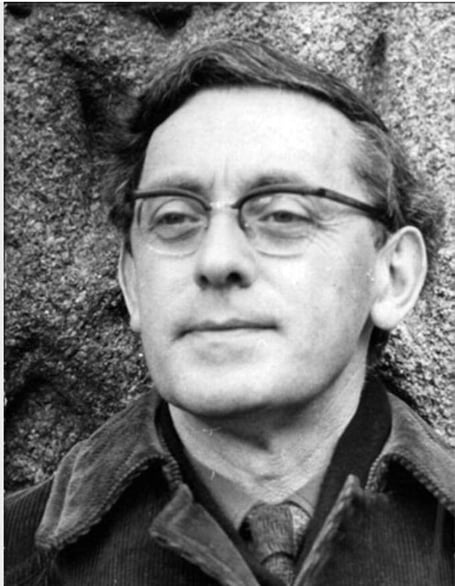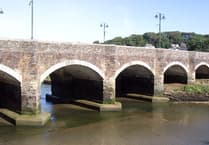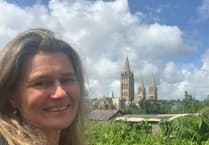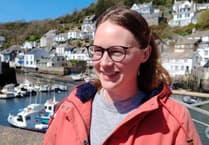Different places in Cornwall have different things synonymous with them.
In Bodmin, the first thing that springs to mind in the minds of many is the rugged wilderness of the adjacent Bodmin Moor, complete with tales of large black cats roaming, in Bude its likely to be the canal but in Launceston, it’s less a place (although the town’s castle and history are very much notable) but more a person. Charles Causley.
Charles Causley was born, lived and died in Launceston – indeed, such was his proximity to the town that he was laid to rest 100 yards from his birthplace.
The son of a groom and gardener, Charles Samuel Causley, and a mother working in domestic service, Laura Jane Bartlett, there was little clues in the early years to the illustrious future that would come from the person that would be seen as Launceston’s favourite son. Indeed, he was educated at the local primary school and Launceston College.
Causley would spend the majority of his formative years in the care of his mother, after his father died from long standing injuries occurred in World War I, in 1924 when Causley was aged just seven.
Leaving school at 16, Causley would first seek employment as a clerk in a builder’s office. It was around this time that his interest in the creative arts which would define his life began; for he played in a semi-professional dance band and wrote plays, one of which was broadcast by the BBC West Country radio service prior to World War II.
Being of adult age upon cessation of hostilities with the Axis powers, Causley, like many men of his age enlisted in the forces, joining the Royal Navy in 1940 where he would serve as an ordinary seaman. His adventures in battle included being aboard the destroyer HMS Eclipse in the Atlantic, time at shore bases in northwest England and Gibraltar before later, after promotion to petty officer serving in the Pacific Ocean on the aircraft HMS Glory.
His war experiences and the impact they had on him would later form the basis of some of his post-World War II pieces; namely a book of short stories called Hands to Dance and Skylark as well as Song of a Dying Gunner A.A.1 from his first collection of poetry, titled Farewell, Aggie Weston, which was published in 1951.
This would be followed by the collection Survivor’s Leave in 1953. Later works would cover a number of themes, including issues dealing with faith, memory, folklore, landscape, travel, relationships (such as friends and family) and a number of children’s poems, some of which are widely read today.
At the end of the war, Causley very briefly moved away from the Cornwall which he called home. He took advantage of a government scheme to train as a teacher, undergoing teacher training in Peterborough. However, the call of the wild would not elude him for long, for after his training was complete, he returned to Cornwall, working full-time as a teacher at his old school for 35 years. After the closure of the National School, he would spend his final year teaching at St Catherine’s Church of England school. He would twice travel abroad, spending time in Perth as a visiting fellow at the University of Western Australia and also at the Banff School of Fine Arts in Canada.
While teaching, Causley continued to write poetry, with his work featuring in magazines, his own books and anthologies as well as collaborating with other poets and corresponding with other well known contemporaries such as Siegfried Sassoon, A.L Rowse, Susan Hill and Jack Clemo, while maintaining a particularly close friendship with the equally celebrated Ted Hughes.
Ted Hughes would later say of Causley: “Among the English poetry of the last half century, Charles Causley’s could well turn out to be the best loved and most needed.... Before I was made Poet Laureate, I was asked to name my choice of the best poet for the job. Without hesitation, I named Charles Causley -- this marvellously resourceful, original poet, yet among all known poets the only one who could be called a man of the people, in the old, best sense. A poet for whom the title might have been invented afresh. I was pleased to hear that in an unpublished letter, Philip Larkin thought the same and chose him too.”
As his teaching career came to a close, Causley took early retirement in order to pursue writing as a full time vocation, and during this time he frequently travelled the world as part of his work, but each time returning home to Launceston.
Causley was seen very much as a Launceston local; while it is often said he was a private man, those who knew him in the town said that despite this he was friendly and approachable.
Age did little to dampen Causley’s taste for the written word, writing until well into his advanced age, before his death in 2003, aged 86. However, his legacy goes beyond just his writings.
The Charles Causley Trust, which was formed after his death, is a registered charity which exists to celebrate the life and work of Causley while promoting new literature activity in both the Launceston community and further afield.
In 2006, it secured Cyprus Well, the small house where Causley lived, for the nation and it is here where visiting poets can stay in residency, conducting events to further the trusts’ mission of furthering the written word in the town.


.jpeg?width=209&height=140&crop=209:145,smart&quality=75)


Comments
This article has no comments yet. Be the first to leave a comment.